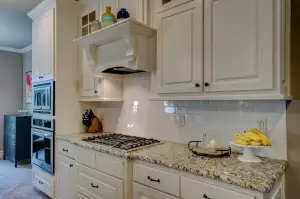Ants in the Kitchen? Say Goodbye with These Effective Home Remedies!

Having ants in the kitchen can be a frustrating and unhygienic problem. Not only do they contaminate our food, but they also pose a threat to our health. Dealing with these tiny invaders requires a proactive approach that combines cleanliness, sealing entry points, and using effective home remedies. In this article, we will explore various methods to bid farewell to ants in the kitchen and ensure a pest-free environment for cooking and dining. By following these simple yet effective steps, you can reclaim your kitchen from these unwanted guests and celebrate the freshness of every food creation.
Identify the ant species
Identifying the ant species is crucial in effectively dealing with an infestation. Common ant species found in kitchens include Argentine ants, odorous house ants, and carpenter ants. Argentine ants are small, light to dark brown ants that form large colonies. Odorous house ants emit a distinct odor when crushed and are typically black or dark brown. Carpenter ants are larger, black or reddish-brown ants that can cause structural damage. Proper identification can help determine the most appropriate treatment method for eliminating these pests from your kitchen.
Clean and declutter the kitchen
Cleanliness and decluttering are essential steps in getting rid of ants in the kitchen. Start by thoroughly cleaning all surfaces, including countertops, floors, and cabinets. Use a mixture of warm water and dish soap to wipe down these areas, as ants are repelled by the scent of soap. Be sure to remove any food crumbs or spills that may attract ants.
Decluttering is equally important as it eliminates potential hiding spots for ants. Remove any unnecessary items from your kitchen, such as piles of newspapers or cardboard boxes. Store food in airtight containers to prevent ants from accessing it.
Regularly sweep and mop the kitchen floor to eliminate any food particles that may have fallen. Pay special attention to hard-to-reach areas like corners and under appliances where crumbs can accumulate.
By maintaining a clean and clutter-free environment, you make your kitchen less inviting for ants and reduce their chances of infesting your space.
Seal entry points
Sealing entry points is an essential step in keeping ants out of your kitchen. Start by inspecting the exterior of your home for any cracks or gaps where ants can enter. Common entry points include windows, doors, and utility pipes. Use caulk or weather stripping to seal these openings.
Inside the kitchen, pay attention to areas where ants may find their way in, such as gaps around plumbing fixtures and electrical outlets. Seal these gaps with silicone caulk or putty.
Remember to check for any holes or gaps in your window screens and repair them promptly. Ants are skilled at finding even the tiniest openings, so be thorough in your inspection and sealing process.
By sealing entry points, you create a physical barrier that prevents ants from entering your kitchen. This simple yet effective method can significantly reduce ant infestations and help maintain a clean and ant-free environment in your home.
Use natural ant repellents
Use natural ant repellents: If you prefer to use natural methods to repel ants, there are several options available. One effective remedy is to sprinkle cinnamon or black pepper along the ant trails and entry points. Ants dislike the strong scent of these spices and will avoid crossing them. Another natural repellent is vinegar. Mix equal parts of vinegar and water in a spray bottle and spritz it on countertops, windowsills, and other areas where ants are seen. The strong odor of vinegar disrupts their pheromone trails, deterring them from entering your kitchen. Additionally, essential oils like peppermint, lemon, or tea tree oil can be mixed with water and sprayed around the kitchen to repel ants. These oils have strong scents that ants find unpleasant. Remember to reapply these natural repellents regularly for maximum effectiveness in keeping ants at bay.
Set up ant baits
Maintain cleanliness and hygiene
Maintaining cleanliness and hygiene in the kitchen is crucial for keeping ants at bay. Regularly clean countertops, floors, and cabinets to remove any food crumbs or spills that may attract ants. Wipe down surfaces with a mixture of vinegar and water, as ants dislike the strong smell of vinegar. Sweep and mop the floors regularly to eliminate any traces of food particles. Store food in airtight containers to prevent ants from accessing it. Additionally, empty garbage cans frequently and keep them tightly sealed. By practicing good hygiene habits in the kitchen, you can significantly reduce the chances of ants infesting your space.
Consult a professional if needed
If you've tried all the home remedies and still find yourself battling with an ant infestation in your kitchen, it may be time to call in the experts. Professional pest control services have the experience and knowledge to effectively eliminate ants from your home.
They will conduct a thorough inspection of your kitchen and identify the specific ant species causing the problem. This is crucial as different ant species require different treatment methods.
Professional exterminators use safe and effective insecticides that are specifically designed to target ants while minimizing harm to humans and pets. They also have access to advanced equipment and techniques that can tackle even the most stubborn infestations.
Remember, trying to handle a severe ant infestation on your own can be time-consuming, frustrating, and potentially harmful. So, don't hesitate to seek professional help if you're unable to get rid of ants in your kitchen despite your best efforts.
By consulting a professional, you can ensure that the infestation is dealt with efficiently and effectively, giving you peace of mind knowing that your kitchen is free from these pesky intruders.
In conclusion, dealing with ants in the kitchen can be a frustrating experience. However, by following these effective home remedies, you can say goodbye to those pesky insects. Start by identifying the ant species to determine the best course of action. Then, clean and declutter your kitchen to eliminate food sources and hiding spots. Seal entry points to prevent future infestations. Utilize natural ant repellents like vinegar, lemon juice, or peppermint oil to deter them from entering your kitchen. Set up ant baits strategically to eliminate the entire colony. Remember to maintain cleanliness and hygiene in your kitchen as ants are attracted to food spills and crumbs. If all else fails, consult a professional pest control service for expert assistance. With these steps in place, you can enjoy a clean and ant-free kitchen once again!
Published: 10. 02. 2024
Category: Home



